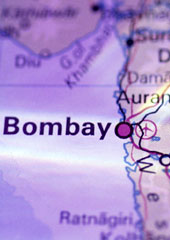Vignettes from India
What does a foreigner see and hear amidst the hustle and bustle of daily life in India?
August 25, 2012

Next to Mumbai, the airport in Lagos has the tranquil atmosphere of a Swiss spa. Checking in at Chhatrapati Shivaji International Airport requires patience and stamina. Already outside the terminal, hundreds pushing carts, with luggage piled high, are trying to weave their way among the honking cars and taxis, forming an endless line.
When at last, passengers reach the entrance, they trickle in two-by-two, slowly, slowly — their documents examined by khaki-clad officers unused to electronic tickets — only to join another line inside the terminal.
Once inside, passengers are informed that they may not bring guns, pistols or revolvers aboard planes. They also learn — perhaps to their chagrin — that they must leave behind their power drills, bows, arrows, saws, axes and martial arts devices.
Customs regulations discriminate between men and women. “Passengers may import jewelry free of duty up to an aggregate value of 10,000 rupees by a gentleman passenger and 20,000 by a lady passenger.”
“Lawyers run riot in Bangalore”, India’s Silicone Valley. According to the Times of India, “Angry lawyers smashed vehicles, torched a police post, and attacked cops, journalists and students inside the civil court… leaving at least 87 people injured” including an 86-year old judge. “In all, 69 cops were wounded apart from 15 lawyers and three reporters”.
Students from a nearby college, who tried to rescue an injured cameraman, were also beaten up by lawyers. Nor was this the first time that excitable sub-continental jurists left their desks and went on a rampage. In fact, the 9-hour pitched battle was in retaliation for the media’s “unfair coverage” of lawyers’ clashes with police of a few weeks before.
In the heart of New Delhi is an idyllic park, home to some 140 stray dogs. Day in and day out, they are fed by the public. Here a lady in sari brings them food, there a former officer, ramrod straight, puts an earthen water bowl on the ground and looks pleased as a dog laps the water up. In winter, people bring blankets.
A Sufi concert, sponsored by the Italian embassy in honor of Sonia Ghandi, India’s half-Italian President, is performed in the gardens of Humayun’s Tomb, a spectacular historical site. Musicians sit on a lit red-brick stage under a full moon. The “Tout Delhi” was invited, but only some showed up.
As the music begins, few in then audience pay attention — they gossip, thread their way from row to row, write e-mail and tweets on their phones. Suddenly, the chanting switches to Italian, a novel attempt at “Sufi-fusion.” The combination of Sufi music and “Amoooooooooore” is so unbearable that quite a few people call it a day.
Toy-like green-and-yellow three-wheeled rickshaws, or tuk-tuks, are ubiquitous. Their pestilential two-stroke engines used to poison Delhi’s air, but then the city government had them all converted to compressed natural gas.
Today, these quaint conveyances zigzag through Delhi’s chaotic traffic without adding to pollution. Amazingly, car drivers seem to be reasonably respectful of the slow beetles.
Ghaziabad’s Institute of Management Technology is a modern business school. Its campus is an oasis of cool and quiet in the dusty city.
Most days, an employee walks the grounds with a tamed ape on a leash. Aggressive monkeys live in the trees above. Because he is larger than the monkeys, the ape scares them away.
He much enjoys his walks, has his days off, and is a popular figure on campus.
One of the major dailies comes out in English as well as Hindi. When asked about the current economic slowdown, the English editor said he thought the end of the world was near.
For his part, the Hindi editor reflected for a while, then explained that India had been muddling along for four thousand years — and that it would surely continue to do so for a while longer.
An English couple are having tea in the cafeteria. They glare at one another. It is late — the place is otherwise deserted. My dinner companion alerts me in a whisper: “There are some serious negotiations going on at that table.”
I prick up my ears and hear the woman, after a very long silence, ask her partner: “And you thought that coming to India would solve our problems?”
